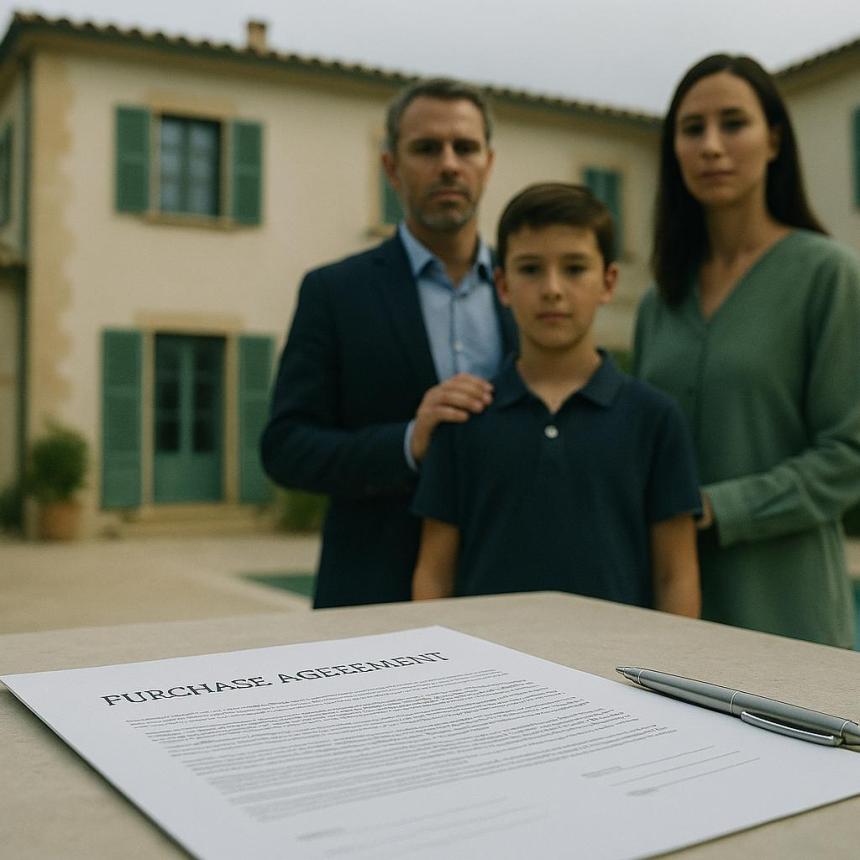It is not uncommon for foreign minors to hold property rights over real estate located in Spain. This may arise from inheritance, donation, or deliberate acquisition as part of a broader estate planning strategy. In high-value transactions, it is particularly frequent to register ownership in the name of children, either to optimise wealth taxation or to prepare for future succession.
Ownership by minors may result from inheritance, donation, or strategic estate planning, but it requires impeccable legal execution.
While these arrangements are often legitimate and well-intentioned, they raise important legal questions when the time comes to sell the property. Can the minor legally sell? Which law governs their capacity? Is judicial authorisation required? And what happens if the minor resides outside Spain?
Can a foreign minor sell property in Spain?
Yes, but only under strict conditions. The sale of real estate by a non-emancipated minor requires a careful assessment of the law governing their legal capacity, and in many cases, prior judicial or administrative authorisation.
The sale of property by a minor requires prior authorisation, except in very specific cases.
Which law applies: Spanish law or the law of the minor’s country?
Although the property is located in Spain, the minor’s legal capacity is governed by the law of their habitual residence. This principle is established under Article 9.6 of the Spanish Civil Code and reinforced by the 1996 Hague Convention on the Protection of Minors.
The applicable law is determined by the minor’s habitual residence, not by the location of the property.
If the minor resides in Spain, Spanish law applies. If the minor resides abroad, the law of their country of residence (or nationality, depending on the case) will govern. This requires coordination with legal professionals in the minor’s country of origin to ensure compliance.
What if the minor resides in Spain?
In such cases, the minor falls under Spanish jurisdiction. The sale of property by a non-emancipated minor requires prior judicial authorisation, in accordance with Article 166 of the Spanish Civil Code.
Spanish judicial authorisation is mandatory when the minor resides in Spain.
The procedure is conducted as a voluntary jurisdiction proceeding before the Court of First Instance in the minor’s place of residence. Parents or legal guardians must demonstrate the necessity or benefit of the sale, and the Public Prosecutor intervenes to safeguard the minor’s interests.
An important exception applies: if the minor is aged 16 or 17 and expressly consents to the sale in a public deed, judicial authorisation may be waived, provided there is no objection from the Public Prosecutor.
Minors aged 16 or 17 may consent to the sale in a public deed, subject to conditions.
What if the minor resides outside Spain?
In this scenario, authorisation must be obtained in accordance with the law of the minor’s country. The first step is to determine whether such authorisation is required under the applicable legislation. If so, it is necessary to identify the competent authority in that jurisdiction.
Each country has its own regime for the protection of minors, requiring cross-border legal coordination.
Examples include:
- In France, authorisation is granted by the guardianship judge.
- In Germany, approval must be obtained from the Family Court.
- In the United Kingdom, the Court of Protection may intervene.
Once authorisation is obtained, it must be presented to the Spanish notary, duly legalised (via apostille or consular route) and officially translated. The notary will verify compliance with the applicable legal framework before authorising the deed of sale.
Authorisation must be legalised and translated to be valid in Spain, although apostille may not be required for documents issued within the EU.
What happens if authorisation is not obtained?
A sale carried out without valid authorisation may be subject to annulment. Upon reaching the age of majority, the minor could challenge the transaction, exposing the buyer to significant legal risk.
Without valid authorisation, the sale may be annulled by the minor once they reach legal age.
In real estate transactions, notarial intervention is required for registration in the Land Registry. If the notary detects the absence of proper authorisation, they will refuse to execute the deed. Even if the deed is mistakenly authorised, the Land Registry will reject its inscription.
Practical recommendations
To mitigate risks and ensure the legal validity of the transaction, it is essential to verify the minor’s habitual residence, as this determines the applicable law. It is equally advisable to engage a lawyer specialised in private international law, capable of coordinating the process both in Spain and in the minor’s country of origin. Authorisation must be obtained in accordance with the relevant legal framework and presented to the Spanish notary, duly legalised and translated. Where Spanish jurisdiction applies, the necessity or benefit of the sale must be clearly documented, particularly when judicial authorisation is sought.
Cross-border legal coordination is essential to ensure legal certainty in transactions involving minors as property holders.
